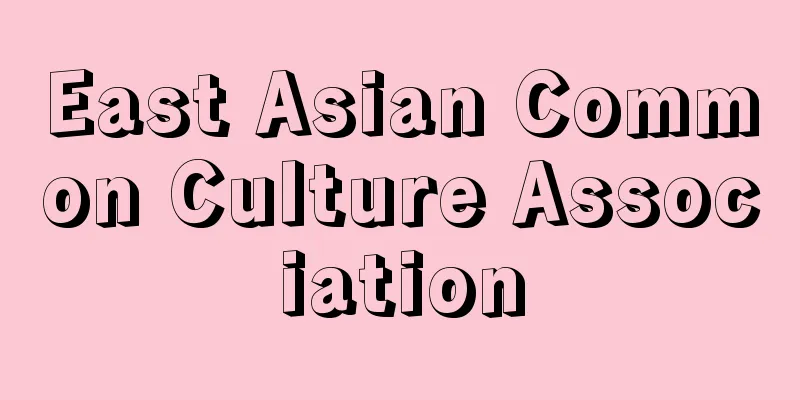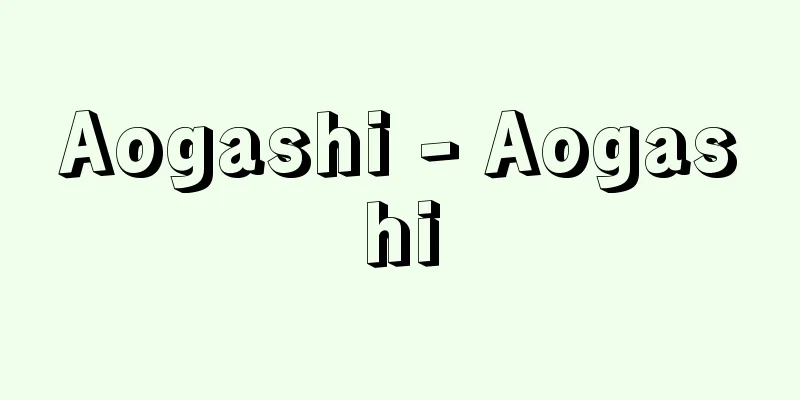East Asian Common Culture Association

|
A hardline foreign policy organization founded in November 1898 (Meiji 31) with the advocacy of "Japan-China alliance" and "preservation of China." Hardline foreign policy means a way of trying to get one's own opinions across to external parties or foreign countries, and was formed in the spring of the same year in response to the advancement of the great powers' lease of China, including Russia's lease of Port Arthur and Dalian in the same year, and the reform movement led by Kang Youwei's faction, resulting in the merger of the East Asia Association, which was founded in the spring of the same year, and the Dobunkai, which was founded in June of the same year. The Toakai was a group consisting of Progressive Party politicians such as Inukai Tsuyoshi and Hiraoka Kotaro, the newspaper Nippon, the Seikyosha group, and students from Tokyo Senmon Gakko and the Imperial University, and aimed to form an alliance with the faction of Sun Yat-sen, while the Dobunkai was a group consisting of continental ronin from the Itsubikai and the Konoe Atsumaro group, and was active in forming an alliance with the Southern Governors' faction, including Zhang Zhidong and Liu Kun-itsu. In May 1900 (Meiji 33), with a government subsidy, they established the Nanjing Dobunshoin in Nanjing, China (it closed after three months due to the Boxer Rebellion and moved to Shanghai. The following year it was called the Toa Dobunshoin), and in 1902 they also established a Dobunshoin in Tokyo to accommodate Chinese students. After the Russo-Japanese War, the company's main activities were education and the publishing of books and magazines related to China. It was dissolved in 1946 (Showa 21). [Masatoshi Sakata] "History of the East Asian Common Culture Academy" (1955), edited and published by the Houyukai Source: Shogakukan Encyclopedia Nipponica About Encyclopedia Nipponica Information | Legend |
|
1898年(明治31)11月に「日清(にっしん)提携」「支那(しな)保全」を標榜して設立された対外硬(たいがいこう)組織。対外硬とは外部や外国に対して自分の方の主張を通そうとするやり方を意味し、同年のロシアの旅順(りょじゅん)・大連(だいれん)租借をはじめとする列強による中国租借の進行、康有為(こうゆうい)派の変法運動などに刺激されて同年春組織された東亜会と同年6月設立された同文会が合併したものである。東亜会は犬養毅(いぬかいつよし)、平岡浩太郎(こうたろう)ら進歩党系政治家、新聞『日本』、政教社グループ、東京専門学校・帝国大学の学生などからなる集団で、孫文(そんぶん)派との提携を志向したのに対し、同文会は乙未(いつび)会系の大陸浪人と近衛篤麿(このえあつまろ)グループからなる集団で、張之洞(ちょうしどう)、劉坤一(りゅうこんいつ)ら南方総督派との提携をねらって活動した。1900年(明治33)5月には、政府の補助金を基に中国南京(ナンキン)に南京同文書院を設立(義和団(ぎわだん)事件のため3か月で閉鎖、上海(シャンハイ)に移った。翌年より東亜同文書院と称す)、また02年には、中国人留学生受け入れのため東京にも同文書院を設立した。日露戦争後は教育事業と中国関係書籍雑誌の出版を主たる事業とするようになった。46年(昭和21)解散。 [酒田正敏] 『滬友会編・刊『東亜同文書院大学史』(1955)』 出典 小学館 日本大百科全書(ニッポニカ)日本大百科全書(ニッポニカ)について 情報 | 凡例 |
<<: East Asian Common Study School
Recommend
Mitsubishi Estate Co., Ltd. - Mitsubishi Estate Co., Ltd.
The second largest general real estate company in ...
Angaridium
… The Angara flora is also called the Kuznetsk fl...
Hot spring village - Onsen shuraku
A settlement that developed as a tourist and recre...
rut
…It is also called “heat” or “rut.” In the broad ...
Hydrofluoric acid (Hydrofluoric acid)
An aqueous solution of hydrogen fluoride (HF). Als...
Kitayama Juhachikendo
<br /> This welfare facility in Kawakami-cho...
Badger baiting
...In folklore, the raccoon dog is the equivalent...
Meshibumi - Meshibumi
〘noun〙① A letter issued by a government office to ...
Indonesian Communist Party (English name) Partai Komunist Indonesia
A political party in Indonesia. Founded on May 23,...
Hikuma - Hikuma
A medieval place name in the province of Totomi. I...
Twill cotton fabric - Ayaorimenpu
…Women were the majority in the bedsheet business...
Enryakuji Temple
The head temple of the Tendai sect is located in ...
Cold Climate Agriculture
Agriculture carried out in cold climates. Agricul...
Kanze Motomasa
1930-1990 A shite Noh actor from the Showa era. B...
AEG Telefunken (company) (English spelling)
Its official name was Allgemeine Elektricitäts‐Ges...









